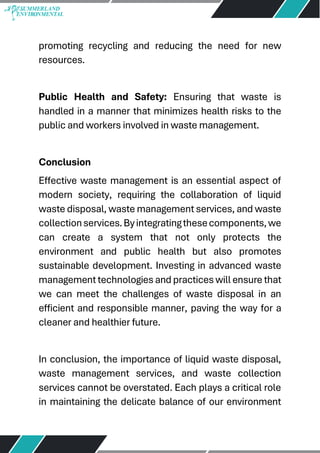A Biased View of Reclaim Waste
A Biased View of Reclaim Waste
Blog Article
Not known Incorrect Statements About Reclaim Waste
Table of ContentsReclaim Waste Can Be Fun For AnyoneReclaim Waste - QuestionsThe Best Guide To Reclaim WasteThe Definitive Guide for Reclaim WasteThe 2-Minute Rule for Reclaim Waste
Check out the types, events, and forms of fluid waste. Domestic sewer waste refers to the waste and products from a domestic sewage-disposal tank. This kind of waste is created by human beings in houses, schools, and various other structures. This only consists of septic systems that have a drainpipe field. The correct management and disposal of domestic sewage waste require fluid waste to be moved to a sewer treatment plant where the appropriate techniques and equipment are applied to purify and dispose of waste.
Industrial waste often includes potential dangers, such as flammable products or a combination of liquid and strong waste products, and needs an advanced and detailed disposal process. The disposal of business waste commonly includes the filtration of waste before transportation to ensure safe and proper disposal. Hazardous waste is created from results and runoff of industrial processes and manufacturing.
This sort of waste can not make use of the very same sewage administration transport or procedures as septic or industrial fluids. The hazardous waste management procedure requires the assessment and testing of liquid waste before it goes through the disposal procedure (liquid waste disposal melbourne). Drainage waste is the fluid waste that comes from overflow and excess stormwater in very populated locations or cities
Runoff waste can trigger contamination and flooding otherwise taken care of appropriately. Find out more regarding drain cleaning and waste monitoring. Making certain correct waste management can prevent disasters and lower environmental damage. Both people in domestic settings and experts in industrial or manufacturing sectors can gain from recognizing the procedures and guidelines of liquid waste management.
Not known Details About Reclaim Waste
Call PROS Providers today to find out about our waste management and disposal solutions and the appropriate methods to take care of the fluid waste you generate.
(https://www.kickstarter.com/profile/reclaimwaste1/about)Do you understand what takes place to your water when you end, purge the bathroom or drain pipes the cleaning device? No? Well, it's worth recognizing. This so-called 'wastewater' is not only an essential resource yet, after therapy, will be launched to our land, rivers or the ocean. Made use of water from bathrooms, showers, baths, kitchen area sinks, washings and commercial processes is referred to as wastewater.

water made use of to cool machinery or tidy plant and equipment). Stormwater, a type of wastewater, is drainage that flows from agricultural and city locations such as roofing systems, parks, gardens, roads, courses and gutters into stormwater drains, after rain. Stormwater moves web link without treatment directly to regional creeks or rivers, eventually reaching the ocean.
Facts About Reclaim Waste Revealed
In Queensland, many wastewater is treated at sewage treatment plants. Wastewater is transported from domestic or commercial websites through a system of drains and pump stations, known as sewerage reticulation, to a sewer therapy plant. City governments construct, maintain and run most sewage therapy plants. Operators are licensed under the Environmental Management Act 1994 to release cured wastewater at an appropriate ecological criterion right into waterways.
The Department of Natural Resources encourages regional federal governments concerning handling, operating and preserving sewage systems and treatment plants. In unsewered areas, city governments may need owners to set up private or home sewer therapy systems to deal with residential wastewater from bathrooms, kitchen areas, restrooms and laundries. The Department of Natural Resources authorizes using household systems when they are proven to be efficient.
In some new neighborhoods, treatment of some stormwater to get rid of litter, sand and gravel has actually started using gross contaminant traps. Wastewater therapy occurs in four stages: Gets rid of solid matter.
Wastewater then flows into big storage tanks where solids work out and are gotten rid of as sludge. Oil and scum are skimmed from the surface area. Makes use of small living microorganisms knows as micro-organisms to break down and remove continuing to be liquified wastes and fine particles. Micro-organisms and wastes are included in the sludge. Removes nitrogen and phosphorus nutrients that could create algal flowers in our rivers and endanger aquatic life.
Not known Facts About Reclaim Waste
Nutrient removal is not offered at all sewage therapy plants because it calls for expensive specialised equipment. Clear fluid effluent produced after therapy may still include disease-causing micro-organisms - liquid waste disposal.

Most wastewater flows right into the sewerage system. Under the Act, regional governments carry out authorizations and permits for environmentally relevant activities (Ages) entailing wastewater releases that might have a regional impact.
Reclaim Waste for Beginners
Tracking supplies factual information about water top quality and can verify that permit conditions are being satisfied. The details gotten via surveillance provides the basis for making water top quality decisions.
Report this page